A two-day high-level meeting on signing, ratification, and domestication of the IGAD Protocol on transhumance (seasonal grazing) kicked off in Torit, Eastern Equatoria State, on Wednesday.
The meeting aims to discuss ways of regulating the movement of cattle across the region to avoid conflicts. It also aims to create awareness among lawmakers so that they can address issues of cattle movement in the region.
Speaking to Journalist after the official opening at Hotel Torit on Wednesday, Ambassador Mohamed Elduma, the acting head of IGAD Mission to South Sudan, said the meeting will ensure timely implementation of the process to streamline the free movement of pastoralists.
“Our meeting today is about domestication and ratification of the IGAD Protocol on transhumance where IGAD officials came a long way to agree on the protocol to facilitate movement of cattle across the region,” he said. “Specifically, we are here in Torit for the historical background of this city and also, almost 90 percent of the people here, as mentioned by the governor, are herders and cattle owners and only 10 percent are farmers.”
Amb. Elduma said the protocol is essential for Eastern Equatoria State which borders the three countries of Ethiopia, Kenya, and Uganda.
“Eastern Equatoria state is bordering three other IGAD countries of Uganda Ethiopia and Kenya and cattle move across those countries and South Sudan,” he added. “So, these protocols will facilitate those movements and will also give us ways to coordinate corridors so that we do not have conflicts between cattle herders and those countries. This protocol will benefit South Sudanese.”
Eastern Equatoria State Governor Louis Lobong Lojore appreciated IGAD and the ministries of foreign Affairs and animal resources for choosing his area to host the high-level meeting.
“There must be a law to regulate the movement of our livestock. What creates fear of the unknown is because there is no law and simply because these cattle keepers are very unruly,” he said. “They cause problems, they move the way they want, they allow the livestock to go to the farms of people but if there is a law, there will be no fear. So, you the parliamentarians need to enact laws.”
Governor Lobong added that the government has the capacity to erect water points in far-flung areas for animals to drink and graze without causing any conflict.
For his part, the Undersecretary at the livestock ministry, Makwei Malual, said South Sudan has experienced several conflicts resulting from cattle movement both internally and externally and that the protocol will act as a framework for ending the continuous violence resulting from the unregulated movement of cattle.
“This protocol and its road map were adopted by the IGAD council of ministers of foreign affairs virtually and the protocol was given to the ministry of livestock and fisheries to present and later it will be sent to IGAD headquarters,” he said. “The specialized center for pastoral areas development was tasked to develop the transhumance protocol that allows free movement and safe and orderly cross border mobility of livestock in search of water and pasture.”
Malual said South Sudan attended many of the consultative workshops which culminated in the development of the transhumance protocol.




